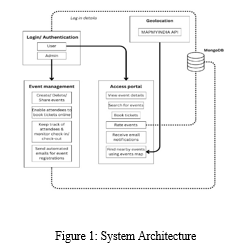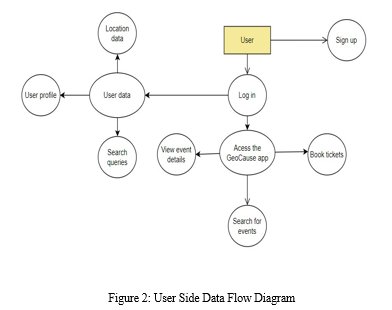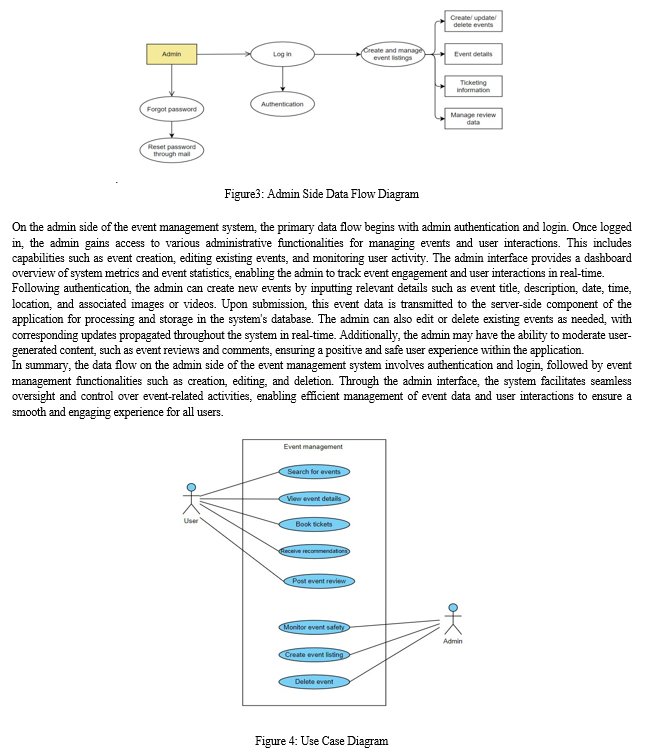Ijraset Journal For Research in Applied Science and Engineering Technology
- Home / Ijraset
- On This Page
- Abstract
- Introduction
- Conclusion
- References
- Copyright
Navigating Event Landscapes: A Study of GPS-Based Event Discovery Systems
Authors: Saee Majlekar, Chinmayi Deshmane, Jidnya Kanekar
DOI Link: https://doi.org/10.22214/ijraset.2024.61003
Certificate: View Certificate
Abstract
This paper proposes a system for locating events that are around the user by using the Global Positioning System. Globally, GPS has transformed location-based services and navigation, radically changing our understanding of and use for geographic positioning. These days, GPS is everywhere. It\\\'s been incorporated into cars, wearable technology, cellphones, and a host of other products. To identify new trends of substantial correlations between geographic regions and events, the proposed system examines the correlation between user locations and event locations in our research. In our research, we aim to explore the evolving landscape of event discovery and participation by harnessing the ubiquitous presence of the Global Positioning System (GPS). With GPS technology seamlessly integrated into various devices and applications, including cars, wearable technology, and smartphones, users have come to rely on its accuracy and accessibility for navigating their surroundings and accessing location-based services. By leveraging the wealth of location data provided by GPS, our proposed system seeks to identify emerging trends and patterns of substantial correlations between user locations and event locations. Through in-depth analysis and correlation studies, we aim to uncover insights that can inform the development of more effective and personalized event discovery solutions, ultimately enhancing the user experience and engagement with local events and activities.
Introduction
I. INTRODUCTION
In today's dynamic society, people are constantly in pursuit of more effective ways to discover and engage with local events and activities that cater to their preferences and schedules. The evolution of technology has significantly altered the lifestyle of individuals, consequently transforming the approach to event discovery. In the past, individuals relied on traditional methods such as newspapers, radio broadcasts, or physically visiting event venues to stay informed about upcoming events. However, with the advent of technology, there has been a paradigm shift towards utilizing digital platforms for event searches. Among these technological advancements, the geolocation-based event finder application emerges as a groundbreaking tool, revolutionizing event exploration by leveraging the capabilities of MapmyIndia APIs. [1]
At the heart of this innovative platform is the integration of MapMyIndia APIs. MapmyIndia APIs offer a comprehensive suite of location-based services, providing developers with access to accurate mapping, navigation, and geocoding functionalities. Leveraging these APIs empowers applications to deliver seamless location-aware experiences, enhancing user engagement and convenience.[1] By exploring the features of MapmyIndia, users can easily explore nearby events based on their current location, eliminating the need for manual searches and providing real-time updates on events happening in their vicinity.
Furthermore, the application goes beyond traditional event discovery by incorporating additional functionalities to enhance the user experience. Alongside event recommendations, users are empowered to locate nearby cafes for refreshments and recharge, ensuring a holistic outing experience. Additionally, the application addresses the perennial challenge of parking availability by providing information on nearby parking spaces, enabling users to plan their journeys with ease.
In a unique twist, the application introduces a feature allowing event organizers to create and manage events through a dedicated server login. This functionality not only ensures the seamless organization of events but also facilitates real-time updates and visibility to users through their respective accounts. By bridging the gap between event organizers and attendees, the application fosters a vibrant community of event enthusiasts.
II. LITERATURE REVIEW
R. Vecera, S. Rozsnyai and H. Roth, "Indexing and Search of Correlated Business Events," The Second International Conference on Availability, Reliability and Security (ARES'07), Vienna, Austria, 2007, pp. 1124-1134, doi: 10.1109/ARES.2007.100. keywords: {Indexing; Business; Monitoring; Engines; Software architecture; Software tools; Application software; Computer architecture; Performance analysis; Intelligent systems}[1]
Syed, Toqeer & Alghamdi, Turki & El-Boghdadi, Hatem. (2018). Event Finder Based on Current GPS Location: The city of Madinah as Use-case. International Journal of Scientific and Engineering Research. 9.[2]
Hai-Tao Zheng, Zhe Wang, Wei Wang, Arun Kumar Sangaiah, Xi Xiao and Congzhi Zhao
Journal: Concurrency and Computation: Practice and Experience, 2018, Volume 30, Number 15, Page e4444
DOI: 10.1002/cpe.4444[3]
J. Allan, J. Carbonell, G. Doddington, J. Yamron, and Y. Yang, ‘‘Topic detection and tracking pilot study: Final report,’’ in Proc. DARPA Broadcast News Transcription Understand. Workshop, Lansdowne, VA, USA, Feb. 1998, pp. 194–218.
III. PROBLEM STATEMENT
The problem statement for this project revolves around the need to develop a comprehensive geolocation-based event finder application that seamlessly integrates MapmyIndia APIs to provide users with tailored event recommendations based on their current location. Additionally, the application must incorporate functionalities to locate nearby cafes and parking spaces, enhancing the overall event experience. Furthermore, there is a requirement for a server-side functionality allowing event organizers to log in and create events, which users can access upon logging into their accounts. This project aims to address the challenges of efficient event discovery, navigation, and organization, ultimately improving user engagement and satisfaction in navigating local events and activities.
IV. PROPOSED SYSTEM
The proposed system is a geolocation-based event finder application that utilizes MapmyIndia APIs to enhance the user experience in discovering nearby events, cafes, and parking spaces. By leveraging the user's current location, the application will offer personalized event recommendations tailored to their preferences and availability. Additionally, the system includes a server-side component allowing event organizers to log in and create events, ensuring users have access to up-to-date event information in real-time. Through intuitive user interfaces and seamless navigation, the proposed system aims to streamline event discovery, foster community engagement, and simplify the process of organizing and attending local events.
With a focus on user convenience and engagement, the proposed system will empower users to view event details, RSVP to events, and receive notifications about upcoming events based on their preferences and location. By integrating MapmyIndia's mapping and location services, the application will enable users to easily locate nearby cafes and parking spaces, further enhancing their overall event experience. Through these features, the proposed system aims to bridge the gap between event organizers and attendees, facilitating seamless interaction and participation in local events while providing organizers with tools to effectively manage and promote their events.
V. DATA FLOW DIAGRAM

The data flow for the proposed geolocation-based event finder application begins with user interaction through the frontend interface. Here, users input their preferences and browse events, leveraging the application's intuitive design for a seamless experience. The application then utilizes geolocation services, such as GPS, to pinpoint the user's current location in real-time. This location data serves as the foundation for providing personalized event recommendations and locating nearby amenities like cafes and parking spaces.
Integration with MapmyIndia APIs forms a pivotal aspect of the data flow, facilitating access to mapping, location, and navigation functionalities. By leveraging MapmyIndia's extensive database, the application retrieves data on nearby events, cafes, and parking spaces. This data undergoes processing before being displayed to the user, ensuring relevance and accuracy in event recommendations and amenities suggestions.
Moreover, the server-side component enables event organizers to log in and manage events efficiently. Upon creation, event details are securely stored in the server's database and made accessible to users through their accounts. This seamless interaction between users, the application, and the server fosters a dynamic ecosystem where event discovery, navigation, and organization converge to enhance user engagement and satisfaction. Through real-time updates and a feedback loop mechanism, the application continually refines its recommendations, ensuring users have access to the most relevant and up-to-date information while navigating local events and activities.

The data flow on the user side of the geolocation-based event finder application commences with user interaction through the frontend interface. Upon launching the application, users input their preferences and navigate through the available features to discover nearby events. The application utilizes geolocation services, such as GPS, to determine the user's current location in real-time. This location data serves as the basis for providing personalized event recommendations tailored to the user's proximity. Additionally, the application employs MapmyIndia APIs to access mapping, location, and navigation functionalities. By integrating with MapmyIndia's extensive database, the application retrieves data on nearby events, cafes, and parking spaces.
Furthermore, users have the capability to explore event details, RSVP to events, and access additional features such as locating nearby amenities like cafes and parking spaces. Through an intuitive and interactive interface, users can seamlessly navigate through event listings, view detailed information about events of interest, and interact with the application's features. Real-time updates ensure that users have access to the most relevant and up-to-date information while navigating local events and activities. Overall, the data flow on the user side facilitates a dynamic and engaging experience, empowering users to discover,

VI. FUTURE SCOPE
In the future, the proposed geolocation-based event finder application can significantly benefit from the integration of machine learning algorithms to enhance event recommendations. By leveraging machine learning techniques, the application can analyze user preferences, past event attendance, and social interactions to provide personalized event suggestions. Algorithms such as collaborative filtering and content-based filtering can be employed to match users with events that align with their interests, while natural language processing can extract meaningful information from event descriptions to further refine recommendations. Additionally, sentiment analysis of user reviews and social media interactions can gauge the popularity and sentiment surrounding events, contributing to more accurate and relevant recommendations. Overall, integrating machine learning into the event finder application holds promise for delivering tailored and engaging event suggestions, thereby enhancing user satisfaction and participation in local events.
Furthermore, the application can continuously learn and adapt to user behavior, improving the accuracy and relevance of event recommendations over time. As users interact with the application and provide feedback, machine learning algorithms can refine their models to better understand user preferences and predict future event interests. This iterative learning process allows the application to evolve dynamically, staying up-to-date with changing user preferences and trends in event participation. By harnessing the power of machine learning, the geolocation-based event finder application can offer a more personalized and enriching experience for users, ultimately fostering greater engagement with local events and activities.
Conclusion
In conclusion, the proposed geolocation-based event finder application represents a significant step forward in enhancing event discovery, navigation, and organization. By leveraging the power of MapmyIndia APIs, the application offers users personalized event recommendations based on their preferences and real-time location, while also providing valuable information on nearby cafes and parking spaces. The inclusion of a server-side component for event creation ensures that organizers can efficiently manage and promote their events, while users can access up-to-date event details in one centralized platform. With intuitive user interfaces and seamless integration of geolocation services, the proposed system aims to streamline the event experience, fostering community engagement and facilitating participation in local events. Overall, the proposed application holds promise in revolutionizing the way users discover, explore, and engage with events in their vicinity, ultimately enhancing the overall event-going experience for all stakeholders.
References
[1] R. Vecera, S. Rozsnyai and H. Roth, \\\"Indexing and Search of Correlated Business Events,\\\" The Second International Conference on Availability, Reliability and Security (ARES\\\'07), Vienna, Austria, 2007, pp. 1124-1134, doi: 10.1109/ARES.2007.100. keywords: {Indexing;Business;Monitoring;Engines;Software architecture;Software tools;Application software;Computer architecture;Performance analysis;Intelligent systems} [2] Syed, Toqeer & Alghamdi, Turki & El-Boghdadi, Hatem. (2018). Event Finder Based on Current GPS Location: The city of Madinah as Use-case. International Journal of Scientific and Engineering Research. 9. [3] Hai-Tao Zheng, Zhe Wang, Wei Wang, Arun Kumar Sangaiah, Xi Xiao and Congzhi Zhao Journal: Concurrency and Computation: Practice and Experience, 2018, Volume 30, Number 15, Page e4444DOI: 10.1002/cpe.4444 [4] J. Allan, J. Carbonell, G. Doddington, J. Yamron, and Y. Yang, ‘‘Topic detection and tracking pilot study: Final report,’’ in Proc. DARPA Broadcast News Transcription Understand. Workshop, Lansdowne, VA, USA, Feb. 1998, pp. 194–218. [5] Vimlesh Ramesh Bhat, Ashu Vashishtha, Naina Goel, and Laxmi R Sisode. Real Time GPS Tracking System for Transport Operations. International Journal of Soft Computing and Engineering (IJSCE), 2231- 2307. [6] Ahmed El-Rabbany. 2002. Introduction to GPS: the global positioning system. Artech house. [7] Simone Frattasi and Francescantonio Della Rosa. 2017. Mo-bile positioning and tracking: from conventional to cooperative techniques. John Wiley & Sons. [4] Google Inc. 2017. What is android. (2017). [8] Abid Khan and Ravi Mishra. 2012. GPS-GSM based tracking system. International Journal of Engineering Trends and Technology 3, 2 (2012), 161-164. [9] Amit Kushwaha and Vineet Kushwaha. 2011. Location based services using android mobile operating system. International Journal of Advances in Engineering & Technology 1, 1 (2011), 14-20.
Copyright
Copyright © 2024 Saee Majlekar, Chinmayi Deshmane, Jidnya Kanekar. This is an open access article distributed under the Creative Commons Attribution License, which permits unrestricted use, distribution, and reproduction in any medium, provided the original work is properly cited.

Download Paper
Paper Id : IJRASET61003
Publish Date : 2024-04-25
ISSN : 2321-9653
Publisher Name : IJRASET
DOI Link : Click Here
 Submit Paper Online
Submit Paper Online

